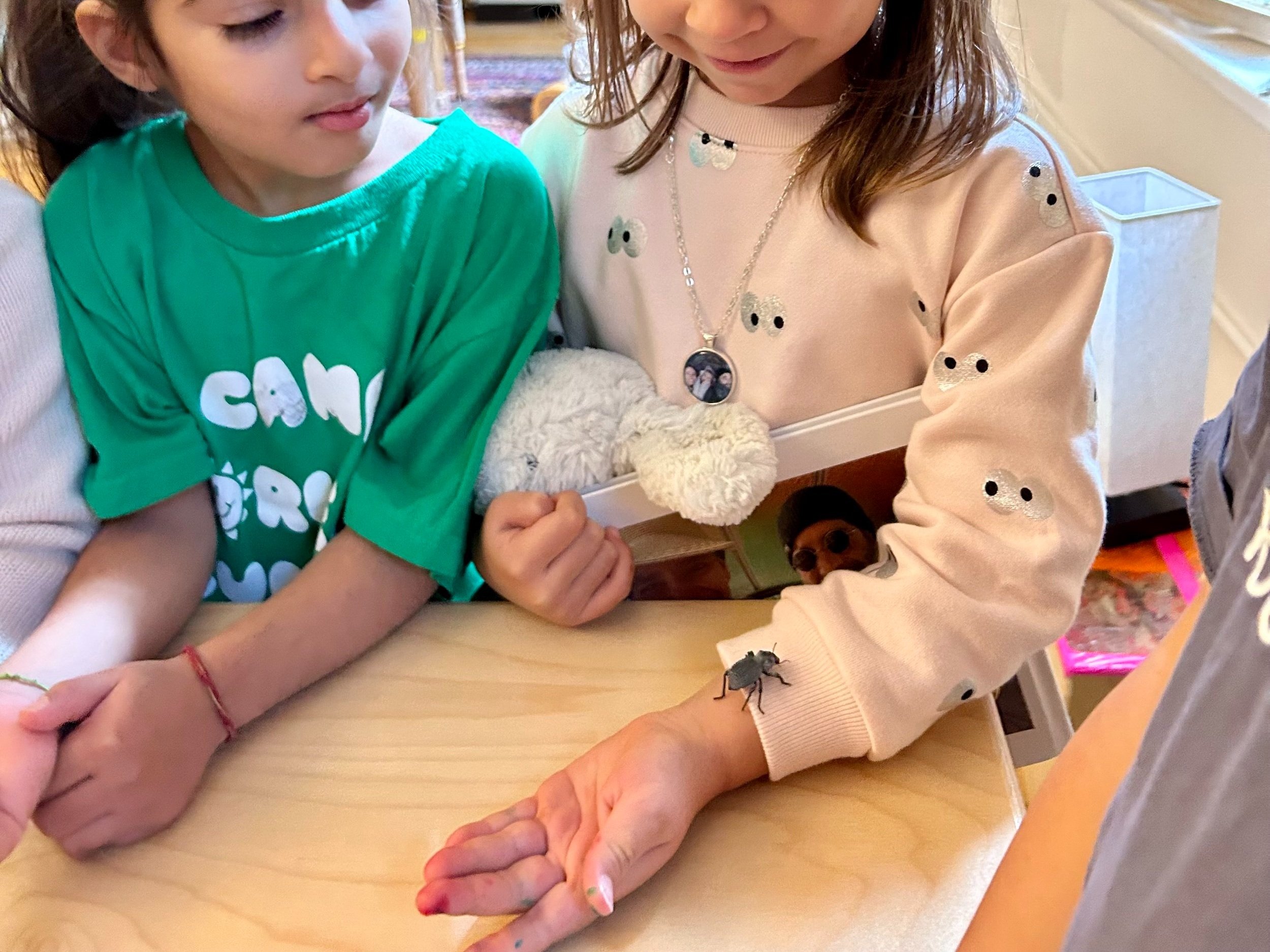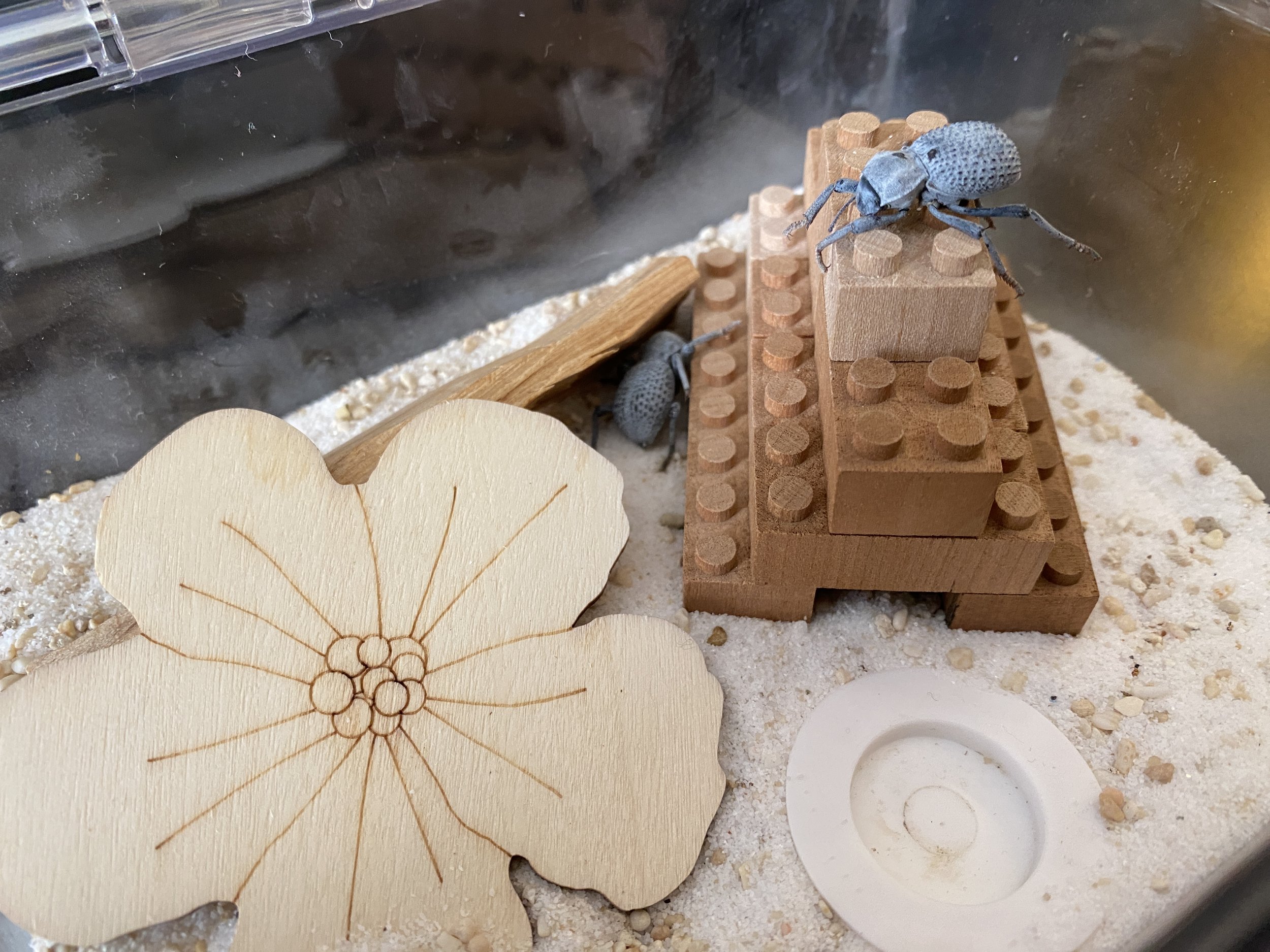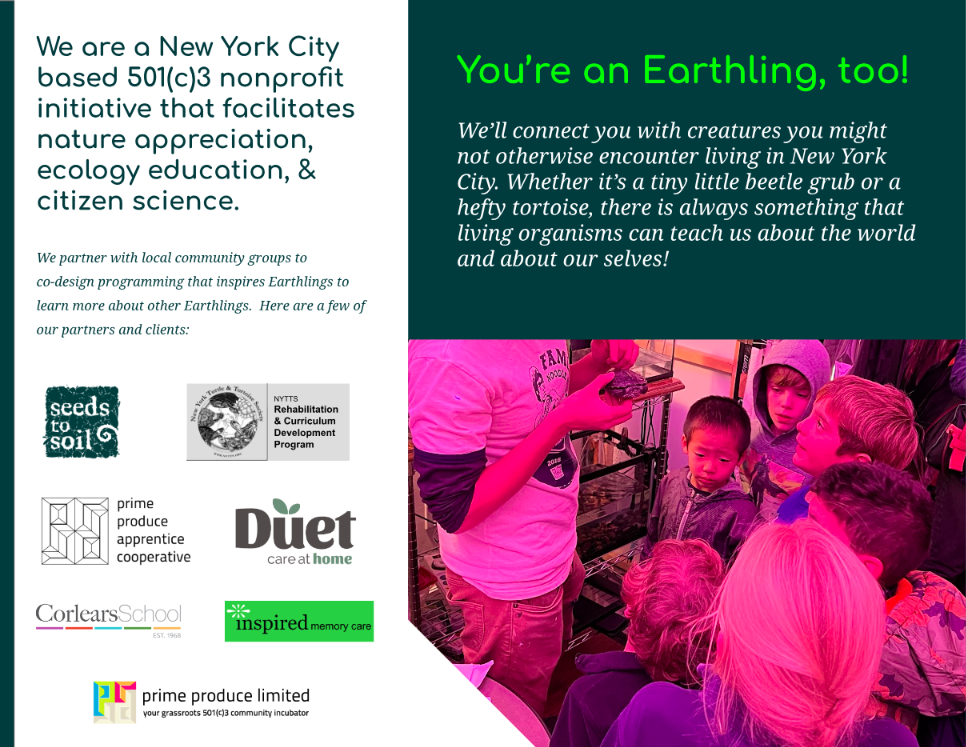
Educational Beetle Box Rentals
Give the Gift of Learning! …through a wondrous, easy pet (that can be returned!)
Join our official Beetle Buddy Box Stewardship program and give your child the gift of a totally marvelous and unusual pet! Don’t take our word for it. Check out this short video to get a feel for how excited kids are to engage nature, science, and… beetles!
A Perfect Starter Pet
These cute baby blue beetles are phenomenal early pets for young learners, whether your household has never kept a pet before or if your child wants to take on more individual responsibility for an animal in a household that already has several pets.
-
They do not bite, sting, or otherwise harm (their biological defense mechanism is to play dead when frightened.) They also don’t fly, jump, or move in any aggressive or startling ways.
-
No special heating, cooling, humidity, or lighting requirements: anywhere in your home is fine.
-
No special food requirements: as desert scavengers, they can subsist on a small scrap from your dinner prep, last week’s leftovers, or even pet food. They also don’t need to drink water, only requiring a small morsel of an apple or carrot every week or so to get the required moisture.
-
Although it is possible to crush or smash these beetles with enough force (and especially their legs can be fragile if yanked the wrong direction), they are also known as ‘Desert Ironclad Beetles’ because they can certainly survive being dropped from standing height onto concrete or crawling off a high tabletop onto a hardwood floor (yes, this happens all the time at our community center.)
-
Look, we love these beetles, but they’re not endangered and we don’t know how long they have to live (since they are currently all wild caught we don’t know their ages) so, if your child does injure or kill a beetle, that gives your family a vital learning opportunity without putting any higher life-forms at risk. Once your child has mastered keeping a beetle, they can move on to a more advanced pet.
-
Did you know invertebrates make up 94% of the Earth’s known animal species? Although we love mammal pets, facilitating a long term connection to organisms like beetles will broaden your child’s understanding of the interconnected systems that make up our planet’s precious ecology – the foundation of which is invertebrates like these beetles. This beetle is a perfect pet to get your child thinking about ecosystems, food chains, and biomes. It’s a special chance to bring a wild (but harmless) creature into their home and imagination. Not only that, but we’ll send over talking points and invite you to participate in our Whatsapp Group, where we can share fun facts and updates you can incorporate into your conversations.
-
Pretty much only a pet rock is easier. Here’s the care sheet.
-
They make an amazing living addition to a home. Don’t take our word for it– our custom original beetle habitats can provide a variety of functions, from kid-focused fun to mindful contemplation to downright aesthetic appeal.
Pets, Learning, & Child Development
If you’re reading this, you perhaps already innately understand that keeping pets affords a fantastic opportunity to learn important life skills, from practicing responsibility to processing loss.
-
The American Academy of Child and Adolescent Psychiatry (AACAP) writes that a child who “learns to care for an animal, and treat it kindly and patiently, may get invaluable training in learning to treat people the same way.” AACAP also notes that “children raised with pets show many benefits. Developing positive feelings about pets can contribute to a child's self-esteem and self-confidence. Positive relationships with pets can aid in the development of trusting relationships with others. A good relationship with a pet can also help in developing non-verbal communication, compassion, and empathy. Pets can serve different purposes for children:
They can be safe recipients of secrets and private thoughts--children often talk to their pets, like they do to their stuffed animals.
They provide lessons about life, including reproduction, birth, illnesses, accidents, death, and bereavement.
They can help develop responsible behavior in the children who care for them.
They provide a connection to nature.
They can teach respect for other living things.”
-
From the BBC:
“Many parents intuitively feel that looking after an animal can offer children valuable lessons about caregiving, responsibility and empathy. "It's really important, especially for young kids, to learn that someone's perspective might be different from their own," says Megan Mueller, associate professor of human-animal interaction at Tufts University, US. "That's an easier lesson to learn, perhaps, with an animal than it is with, say, a sibling or a peer."
But claims about the beneficial impacts of pets on children go further, suggesting that pets can influence children's social skills, physical health, and even cognitive development, and that keeping them is associated with higher levels of empathy. For children with autism and their families, pet care may help reduce stress and create opportunities to form supportive bonds.
Other research shows that children gain from animals in-the-moment, too. In one pair of studies, children made fewer errors on an object categorisation task and needed fewer prompts in a memory task when there was a dog in the room. Research has even found that, for adults at least, the simple act of viewing our pets as family members improves our wellbeing – though headlines touting the wide-ranging benefits of pet ownership are not without criticism, since people often believe that their pets improve their health and happiness, even when objective measures don't show any difference.” (Oakes, 2022)
-
Research has also suggested that encouraging children to participate in pet care can promote attachment between children and their pet, resulting in positive outcomes for both children (such as reduced aggression, better well-being, and quality of life) and pets (such as humane treatment.) (Hawkins, Williams, & Scottish Society for the Prevention of Cruelty to Animals, 2006)
The NIH Reports:
“Interacting with animals has been shown to decrease levels of cortisol (a stress-related hormone) and lower blood pressure. Other studies have found that animals can reduce loneliness, increase feelings of social support, and boost your mood.
…
Another study found that children with autism spectrum disorder were calmer while playing with guinea pigs in the classroom. When the children spent 10 minutes in a supervised group playtime with guinea pigs, their anxiety levels dropped. The children also had better social interactions and were more engaged with their peers. The researchers suggest that the animals offered unconditional acceptance, making them a calm comfort to the children.
“Animals can become a way of building a bridge for those social interactions,” Griffin says. He adds that researchers are trying to better understand these effects and who they might help.
Animals may help you in other unexpected ways. A recent study showed that caring for fish helped teens with diabetes better manage their disease. Researchers had a group of teens with type 1 diabetes care for a pet fish twice a day by feeding and checking water levels. The caretaking routine also included changing the tank water each week. This was paired with the children reviewing their blood glucose (blood sugar) logs with parents.
Researchers tracked how consistently these teens checked their blood glucose. Compared with teens who weren’t given a fish to care for, fish-keeping teens were more disciplined about checking their own blood glucose levels, which is essential for maintaining their health.” (National Institute of Health, 2018)
-
Many of these studies focus on companion animals that are bigger and furrier (like dogs and cats), but we think other kinds of smaller pets (like our beetles) still offer a special learning opportunity, an alternative mode of pet-keeping where a large mammal isn’t a realistic/convenient option, or as a way to introduce the child to the broader world of ecology beyond commonly available domesticated pets.
As aptly put by the Los Angeles Times (2005), “many kids prefer creepy-crawlies as pets”, and as passionately argued by Margie Palatini’s children’s picture book, an insect may turn out to be the perfect pet for the whole family!
-
Due to urbanization and the rise of sedentary pastimes, children are experiencing less connection with nature, a phenomenon referred to as “the extinction of experience” by researchers (Soga & Gaston, 2016).
Research suggests that childhood participation with nature, even “domesticated” nature, may set an individual on a trajectory toward adult environmentalism (Wells & Lekies, 2006).
In one study, researchers assessed a six-week bird-feeding and monitoring project ("Bird Buddies")-- an initiative conducted across eight (sub-)urban primary schools in the UK, (N = 220, 7-10 yo). They found evidence for enhanced awareness of local biodiversity, alongside significant gains in both bird identification knowledge and attitudes, which were greatest for children with little prior exposure to nature. Many children expressed a keenness to continue improving the environmental value of their school grounds and to apply elements of the project at home. Student project evaluation scores were consistently positive. Mirroring this, participating teachers endorsed the project as a positive learning experience for their students. One year after the project, several schools were continuing to feed and watch birds. They concluded that engagement in similar types of environmental activities, if repeated locally/longer term, could enhance children’s experience with nature in urban settings with combined positive environmental impact (White, Eberstein, & Scott, 2018).

Supporting Grassroots Ecology Education & Circular Economies
Your participation in our Beetle Buddy Box Stewardship program not only funds our ability to realize programs like this, but it also enables us to support other local citizen science and community-centered programming, from independent scientific research opportunities to supporting creatives who can learn about entomology while creating these marvelous beetle habitats.
We think this community-based education is as much about community organizing as it is about citizen science. This isn’t just a “pet rental” — it’s an experiment in collective stewardship!
Additionally, we’ve structured this as a membership subscription service for several reasons: (as pulled from our F.A.Q.)
1. We want folks to think of this as a practice of intentional stewardship, not ownership. You (and perhaps your family) are becoming a member of the Beetle Buddies citizen science program, volunteering your time to care for and learn about the beetles. When stewards have concluded their practice, they return the beetle and art enclosure, keeping them out of the waste stream and going to another learner. NOTE: if we discover that you are not taking good care of the beetles, you must return the whole kit!
2. Our team will provide ongoing support for beetle care and replacement as well as art enclosure maintenance and repair. Since these species of desert beetles are mostly wild caught, we never know their ages and they might die of old age at any time!
3. As a monthly subscription, we can bring down the upfront price for young people or folks who can’t afford the labor cost that goes into hand-making these art enclosures.
4. As this is part of a citizen science and education initiative, so we want to keep track of who’s actively keeping the beetles, what they may be learning through regular observation, and how it’s improving their lives. We also plan to provide opportunities to upgrade your enclosure or trade it in for new models!
Your monthly membership is also tax deductible as a contribution to our charitable programming efforts. At the end of the year, we will send out a donation receipt for your contribution!
Your only responsibility is picking up the box and then returning it to our centrally located location near Columbus Circle in Manhattan. When scheduling allows, our team may be able to deliver the boxes and give a little intro talk on a case by case basis (we also offer fee-based educational programs).
Earthlings NYC creates programming to nourish citizen science and ecology-related education in our communities. We are a 501(c)3 initiative affiliated with Seeds To Soil and Prime Produce, based out of the cooperatively-run Guild for Good guildhall at 424 West 54th St in Hell’s Kitchen.
We provide opportunities for learners of all ages to interact with creatures they may not otherwise encounter living in New York City. Whether it’s a tiny little beetle grub or a hefty tortoise, there is always something living organisms can teach us about the world and about our selves!
We have worked with both institutional partners as well as friends and neighbors to bring education and wonder to New Yorkers of all ages. Click below to see some of our partners and our general program summary.
















